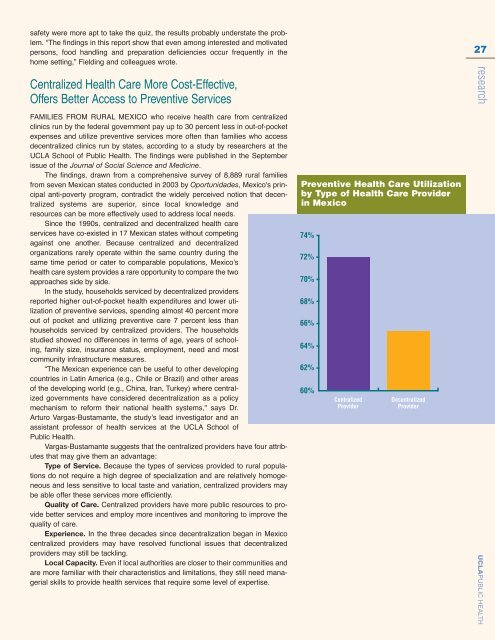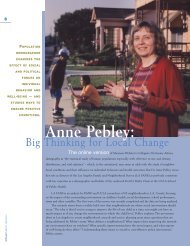A BROADER VIEWOF HEALTH: - UCLA School of Public Health
A BROADER VIEWOF HEALTH: - UCLA School of Public Health
A BROADER VIEWOF HEALTH: - UCLA School of Public Health
You also want an ePaper? Increase the reach of your titles
YUMPU automatically turns print PDFs into web optimized ePapers that Google loves.
safety were more apt to take the quiz, the results probably understate the problem.<br />
“the findings in this report show that even among interested and motivated<br />
persons, food handling and preparation deficiencies occur frequently in the<br />
home setting,” fielding and colleagues wrote.<br />
Centralized <strong>Health</strong> Care More Cost-Effective,<br />
Offers Better Access to Preventive Services<br />
fAMILIeS froM rUrAL MexICo who receive health care from centralized<br />
clinics run by the federal government pay up to 30 percent less in out-<strong>of</strong>-pocket<br />
expenses and utilize preventive services more <strong>of</strong>ten than families who access<br />
decentralized clinics run by states, according to a study by researchers at the<br />
<strong>UCLA</strong> <strong>School</strong> <strong>of</strong> <strong>Public</strong> health. the findings were published in the September<br />
issue <strong>of</strong> the Journal <strong>of</strong> Social Science and Medicine.<br />
the findings, drawn from a comprehensive survey <strong>of</strong> 8,889 rural families<br />
from seven Mexican states conducted in 2003 by Oportunidades, Mexico's principal<br />
anti-poverty program, contradict the widely perceived notion that decentralized<br />
systems are superior, since local knowledge and<br />
resources can be more effectively used to address local needs.<br />
Since the 1990s, centralized and decentralized health care<br />
services have co-existed in 17 Mexican states without competing<br />
against one another. Because centralized and decentralized<br />
organizations rarely operate within the same country during the<br />
same time period or cater to comparable populations, Mexico’s<br />
health care system provides a rare opportunity to compare the two<br />
approaches side by side.<br />
In the study, households serviced by decentralized providers<br />
reported higher out-<strong>of</strong>-pocket health expenditures and lower utilization<br />
<strong>of</strong> preventive services, spending almost 40 percent more<br />
out <strong>of</strong> pocket and utilizing preventive care 7 percent less than<br />
households serviced by centralized providers. the households<br />
studied showed no differences in terms <strong>of</strong> age, years <strong>of</strong> schooling,<br />
family size, insurance status, employment, need and most<br />
community infrastructure measures.<br />
“the Mexican experience can be useful to other developing<br />
countries in Latin America (e.g., Chile or Brazil) and other areas<br />
<strong>of</strong> the developing world (e.g., China, Iran, turkey) where centralized<br />
governments have considered decentralization as a policy<br />
mechanism to reform their national health systems," says Dr.<br />
Arturo Vargas-Bustamante, the study’s lead investigator and an<br />
assistant pr<strong>of</strong>essor <strong>of</strong> health services at the <strong>UCLA</strong> <strong>School</strong> <strong>of</strong><br />
<strong>Public</strong> health.<br />
Vargas-Bustamante suggests that the centralized providers have four attributes<br />
that may give them an advantage:<br />
Type <strong>of</strong> Service. Because the types <strong>of</strong> services provided to rural populations<br />
do not require a high degree <strong>of</strong> specialization and are relatively homogeneous<br />
and less sensitive to local taste and variation, centralized providers may<br />
be able <strong>of</strong>fer these services more efficiently.<br />
Quality <strong>of</strong> Care. Centralized providers have more public resources to provide<br />
better services and employ more incentives and monitoring to improve the<br />
quality <strong>of</strong> care.<br />
Experience. In the three decades since decentralization began in Mexico<br />
centralized providers may have resolved functional issues that decentralized<br />
providers may still be tackling.<br />
Local Capacity. even if local authorities are closer to their communities and<br />
are more familiar with their characteristics and limitations, they still need managerial<br />
skills to provide health services that require some level <strong>of</strong> expertise.<br />
Preventive <strong>Health</strong> Care Utilization<br />
by Type <strong>of</strong> <strong>Health</strong> Care Provider<br />
in Mexico<br />
74%<br />
72%<br />
70%<br />
68%<br />
66%<br />
64%<br />
62%<br />
60%<br />
Centralized<br />
Provider<br />
Decentralized<br />
Provider<br />
27<br />
research <strong>UCLA</strong>PUBLIC <strong>HEALTH</strong>

















